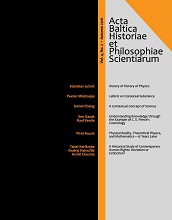Understanding Knowledge through the Example of C. S. Peirce’s Cosmology
Understanding Knowledge through the Example of C. S. Peirce’s Cosmology
Author(s): Enn Kasak, Raul VeedeSubject(s): History of Philosophy, Epistemology, Pragmatism, Philosophy of Science
Published by: Tallinna Tehnikaülikooli õiguse instituut
Keywords: cosmology; history of science; knowledge; i-knowledge; Charles Sanders Peirce; philosophy of science; pragmatism; pragmaticism; realism;
Summary/Abstract: In the era of Charles Sanders Peirce, cosmology was similar to philosophy that was still aspiring to be scientific. Peirce, having worked as an astrophysicist, supported cosmology’s strive towards science. In cosmology, one often relies on knowledge different from everyday knowledge: such knowledge is very general and is situated on the boundaries of what is known; it is very difficult to ascertain it empirically. After Karl Popper, a realist may distinguish between subjective and objective knowledge but this distinction does not suffice for cosmology. A pragmaticist following Peirce could distinguish knowledge about real ideas, which could be termed i-knowledge. This could mean being made party to or being grasped by real ideas functioning outside ourselves. Expressing all i-knowledge as propositional knowledge is difficult. However, non-propositional i-knowledge can sometimes be expressed as principles or paradoxically.
Journal: Acta Baltica Historiae et Philosophiae Scientiarum
- Issue Year: 4/2016
- Issue No: 2
- Page Range: 69-87
- Page Count: 19
- Language: English

